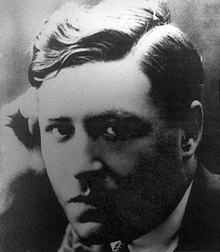Josep Pla
| Josep Pla i Casadevall | |
|---|---|

Josep Pla in 1917
|
|
| Born | Josep Pla i Casadevall 8 March 1897 Palafrugell, Catalonia, Spain |
| Died | 23 April 1981 (aged 84) Llofriu, Catalonia, Spain |
| Occupation | Journalist and writer |
| Language | Catalan and Spanish |
| Nationality | Spanish |
Josep Pla i Casadevall (Catalan pronunciation: [ʒuˈzɛp ˈpɫa]) (8 March 1897, Palafrugell, Girona - 23 April 1981, Llofriu, Girona) was a Catalan Spanish journalist and a popular author. As a journalist he worked in France, Italy, England, Germany and Russia, from where he wrote political and cultural chronicles in Catalan.
The son of rural business owners of modest means from Baix Empordà, he obtained his high school diploma in Girona, where, beginning in 1909, he was a boarding student at the Colegio de los Maristas (Marist School). In his last academic year (1912–13), he had to take his final exams without having taken the courses because he was expelled from the boarding school. In 1913 he registered to study science at the University of Barcelona and began his studies in medicine, but in the middle of his first course, he changed his mind and registered to study law. The emptiness that he felt in his life at the university did not prevent him from involving himself in another environment that would focus the intellectual disorientation of his youth - the Barcelona Ateneo Club, with its library and above all the daily tertulia (discussion group) led by Dr. Joaquim Borralleras and attended by celebrities such as Josep Maria de Sagarra, Eugeni d'Ors and Francesc Pujols. His admiration for Pío Baroja came from this period – a constant reference for his generation — as well as the influence of Alexandre Plana, a childhood friend and teacher, whom he credits with his decision to distance himself from the pretentious style of the 19th century and to support “a literature for the whole world” based on “intelligibility, clarity, and simplicity”, ideas which would be constant features through his literary career.
...
Wikipedia
